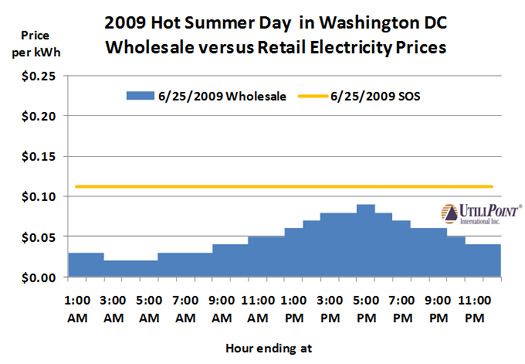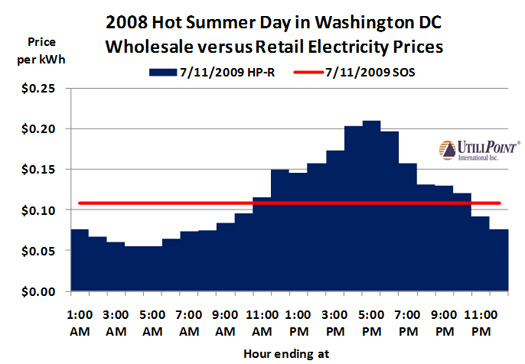What's Really Scary About Smart Metering
Location: New York
Author:
Patti Harper-Slaboszewicz
Date: Thursday, July 9, 2009
Will smart metering usher in an era of government interference in how you use energy? Some are posting articles1 online that our government wants to take control of our appliances and introduce energy rationing, threatening our personal freedom. I didn't realize our usually staid industry was that exciting—it sounds almost like we're planning to impose a dictatorship rather than upgrading our electric grid to take advantage of modern technology!
The push for smart metering is not the culprit but instead a first wave of preparation for high energy prices. We have a temporary respite from high energy prices due to the unexpected and widespread global economic crisis that has led to a significant and sustained reduction in demand for energy. By 2012 or 2014, we expect energy demand to again reach levels we witnessed in 2008. High demand for energy will also bring back the extremely high energy prices we saw last summer, maybe not immediately but probably not that far behind.
Are we alone in worrying about energy prices rising again? No. In the District of Columbia, wholesale energy prices are dramatically lower this year than last year, even on hot summer days. One might expect, then, that consumers would be paying less for electricity in the District. But, this is not so. Customers are paying a high risk premium per kWh (ranging from 3 cents to 11 cents per kWh) because energy suppliers are worried that wholesale energy prices will again follow commodity prices higher.

In the above chart comparing wholesale to retail prices on a recent hot weekday in D.C., the wholesale price never rose above the retail price (labeled as SOS price). However, in the chart below, for a similarly hot weekday in 2008, wholesale prices were higher than corresponding retail prices for 13 hours of the day. The gap between wholesale and retail prices you see in the chart above is the risk premium customers are paying so suppliers are covered if prices go back up to 2008 levels, or higher.

The key issue is that the United States and other nations that import energy do not have the ability to significantly alter global demand for energy outside of their own demand for energy. We won't be in a strong position to negotiate better pricing when energy markets heat up again. Energy prices will stop meandering around at today's levels and reach new heights, driven by sustained increases in demand that will dwarf increases in supply.
And the difficult part to swallow is that there's not a lot we can do about anticipated higher energy prices except to insulate ourselves by starting to reduce our energy imports. Even if we start now on a massive campaign to reduce energy waste and reduce our dependence on foreign oil, it will take decades to make a dent in our oil or other energy imports. Meanwhile, the global demand for energy is destined to grow as China, India and other countries increase their demand for energy. Their citizens are interested in owning cars, air conditioning their homes in the summer and heating with clean central heat. They want big screen TVs, computers, electric dryers, bigger homes and more room for their families. They represent a growing and viable market for energy.
In the United States and Western Europe, we don't ration energy but we restrict access inefficiently by using average pricing. Most people pay the same price for electricity over a season with little or no regard to how much it costs to produce on any particular day. While everyone is talking about smart metering, it is not the cause of the coming crisis but rather evidence of our concern. With smart metering, we can improve how we price energy, charging customers higher prices when it costs more to produce and deliver electricity and charging less other times. Customers can then reduce their costs by substituting cheaper electricity for more expensive energy and by learning how to use energy more wisely in general. The goal is to appropriately price energy so that demand is less than supply, thus avoiding the need to ration electricity. Because the use of electricity is pervasive in our society, we must consider needs of customers with limited income while we use price to reduce demand for expensive electricity.
Threats of government control of our appliances arise because we can set up home area networks which allow customers to control their energy use remotely, avoiding the need to physically go to each device and make an adjustment as prices change. However, it is accurate to say that if electrical devices can be controlled remotely, it's possible to restrict energy usage to avoid rolling blackouts or catastrophic system failure. If energy is appropriately priced to reflect current demand, true emergencies should be rare since consumers respond to higher prices by limiting consumption. Having the ability to curtail load in an emergency is better than widespread outages where customers would not be able to use any electricity at all for extended periods of time. Most would rather their refrigerator continued to run and have a few lights on rather than sit in the dark while their food spoils.
The harsh reality is that we need to learn to live without consuming as much energy as we do today because the world can't easily support the large increases in energy demand forecast to occur over the next 10 to 20 years. Consumers in the United States have started down the road of using less gasoline.2 In 2007, Americans used 371.2 million gallons per day, compared with 345.7 million per day estimated for 2009, a 6.9 percent decline. Americans are not expected to ever reach 2007 levels of consumption again, even after the economy recovers, due to consumer interest in cars with better gas mileage, although not everyone agrees with this view. However, global demand for oil will exceed 2007/2008 levels despite declining U.S. demand.
Only a small percentage of families in China own cars compared to the United States but this is changing. In 2008, it is estimated that there were 43 people per car in China with approximately 30 million cars on the road. In the United States, currently 1.4 people share a car today. This year it is expected the number of new cars sold in China will exceed that of the United States for the first time.3 Some estimates predict there will be 200 million cars on the road in China within two decades. Even if 50 percent of new cars sold in China are electric, in the coming decade China's demand for oil/gasoline is going to grow at a fantastic rate to fuel these new cars. Unlike the United States, new cars in China are not replacing older cars but adding to the number of cars on the road.4 Even with 200 million cars on the road in China, that works out to 6.5 people per car in China, still considerably more than the United States.
As gasoline prices increase in response to increased global demand, more consumers will make the switch to hybrids and electric cars. We need smart metering to ensure recharging of batteries occurs at times that don't increase our peak demand for electricity and increase electricity costs. Electricity demand worldwide will increase as consumers buy homes in suburbia, use air conditioning and in general, adopt the use of modern conveniences. We need smart metering to help educate customers on how to use energy wisely and to help us adjust to a world where as far as energy is concerned, we're along for the ride rather than driving.
So if you're one of those worried about smart metering, you might want to worry instead about why we want to install it.
1 See
www.examiner.com/x-12638-El-Dorado-County-Conservative-Examiner~y2009m6d22-Be-skeptical-of-new-smart-meters
for the ranting and raving approach.
2 Russell Gold and Ana Campoy, "Oil Industry Braces for Drop in
U.S. Thirst for Gasoline," April 13, 2009, Online.WSJ.com,
http://online.wsj.com/article/SB123957686061311925.html
3 "China Cars: Confidence Returns," June 17, 2009,
http://viewswire.eiu.com/article/ib764597661.html?pubtypeid=1112462496
4 Chris Isidore, "America's Vanishing Cars," March 13, 2009,
CNNMoney.com,
http://money.cnn.com/2009/03/13/news/companies/vanishing_cars/index.htm
UtiliPoint's IssueAlert® articles are compiled based on the independent analysis of UtiliPoint consultants. The opinions expressed in UtiliPoint's® IssueAlert® articles are not intended to predict financial performance of companies discussed, or to be the basis for investment decisions of any kind. UtiliPoint's sole purpose in publishing its IssueAlert articles is to offer an independent perspective regarding the key events occurring in the energy industry, based on its long-standing reputation as an expert on energy issues. © 2008, UtiliPoint® International, Inc. All rights reserved. To subscribe or visit go to: www.utilipoint.com